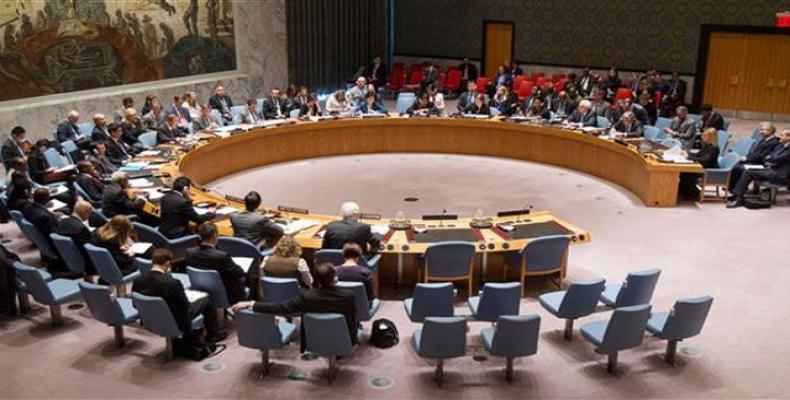United Nations, April 11 (RHC)-- The United Nations Security Council met Wednesday to discuss the current situation in Venezuela, a high-level meeting in which the U.S. Vice President Mike Pence participated.
During his speech before the Security Council, Vice President Pence made no new proposal but repeated Washingtons' previous requests, insisting that President Nicolas Maduro must leave office. Pense said: "The time has come for the United Nations to recognize interim president Juan Guaido as the legitimate president of Venezuela and seat his representative in this body," although it was not immediately clear if he was proposing a resolution in the Security Council or the General Assembly.
As part of his argument against the legitimate Venezuelan government, Pence also told Venezuela’s Ambassador Samuel Moncada “with all due respect, you shouldn’t be here.”
In response, Russia’s United Nations permanent representative Vasily Nebenzya questioned the real intentions behind the U.S. aid and stressed that Venezuela does not reject international cooperation when it is friendly. "The U.S. has still not overcome the devastation of Hurricane Maria," the Russian ambassador said in response to Pence claiming the U.S. is trying to deliver aid to Venezuela, adding that the Venezuelan government "is not rejecting humanitarian assistance. Russia and other countries have provided assistance along with WHO."
During his speech, the Russian ambassador pointed out that the current situation in Venezuela is related to the U.S. geopolitical interest of controlling the region.
"If you want to make America great again stop interfering in the interest of other states," Nebenzya said and, addressing the Latin American neighboring, made it clear that “Venezuela is a bargaining chip for geopolitical influence in the world." At the end of his first speech, the Russian representative stated that "we call on the U.S. to recognize the right of the Venezuelan people's rights to choose their leadership."
China’s Ambassador at the United Nations, Liu Jieyi, mentioned that his country has been following the developments in Venezuela closely “in the hope that the Venezuelan affairs be handled internally," recalling that the first batch of Chinese Humanitarian aid was delivered on March 29. "Unilateral sanctions will only worsen the situation. It won't help resolve the problems nor will it bring peace," Liu said.
Besides rejecting any military intervention in the Bolivarian country, the South African representative Jerry Matjila, asked for the U.N.'s respect for the impartiality, neutrality and independence in aid provision.
“The current situation in Venezuela requires a constructive and united approach by the Council,” Matijla stated and added that “the political situation and continued economic difficulties in Venezuela is a result of a myriad of factors, including conflicting geopolitical dynamics.”
Once the first round of statements was concluded, Venezuela’s Ambassador Samuel Moncada took the floor and strongly rejected the U.S. interpretation of what is happening in his country. "To begin, I think it is called upon us to speak on the falsehoods that have been spoken about Venezuela,” he said and denounced that a new coup attempt had just happened yesterday, as “the U.S. is attempting to pillage our resources.”
Moncada also expressed his categorical denial of the U.S. statements, which has no basis in the Venezuelan constitution and laws. "The only state representing Venezuela is the Bolivarian Republic of Venezuela," he said and framed the so-called humanitarian crisis as "part of the machinery of lies spread about the government of Venezuela.”
The prior Security Council meeting on Venezuela was held on February 28th, when Russia, China and South Africa vetoed a U.S. draft resolution in which the Venezuelan government would have been held responsible for the country's economic collapse, a political maneuver aimed at disguising the U.S. economic war against the government of Nicolas Maduro.
Venezuela fires back at Mike Pence at United Nations


